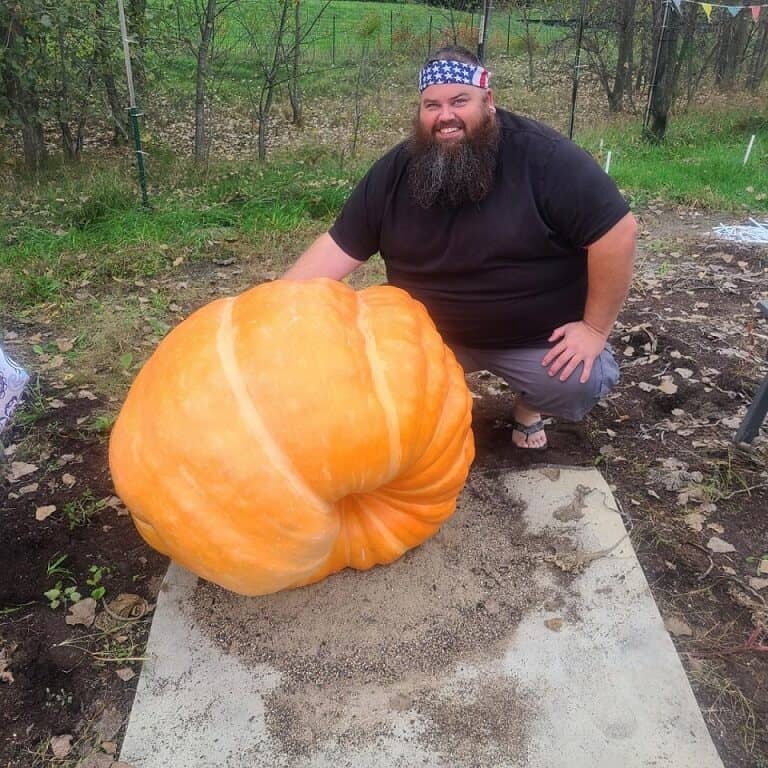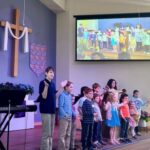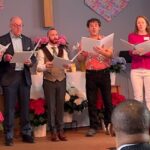Monday, April 15
Ephesians 4:1-7, 10-16
Unity in the Body of Christ
I, therefore, the prisoner in the Lord, beg you to walk in a manner worthy of the calling to which you have been called, with all humility and gentleness, with patience, bearing with one another in love, making every effort to maintain the unity of the Spirit in the bond of peace: there is one body and one Spirit, just as you were called to the one hope of your calling, one Lord, one faith, one baptism, one God and Father of all, who is above all and through all and in all.
But each of us was given grace according to the measure of Christ’s gift.
He who descended is the same one who ascended far above all the heavens, so that he might fill all things.) He himself granted that some are apostles, prophets, evangelists, pastors and teachers to equip the saints for the work of ministry, for building up the body of Christ, until all of us come to the unity of the faith and of the knowledge of the Son of God, to maturity, to the measure of the full stature of Christ. We must no longer be children, tossed to and fro and blown about by every wind of doctrine by people’s trickery, by their craftiness in deceitful scheming; but speaking the truth in love, we must grow up in every way into him who is the head, into Christ, from whom the whole body, joined and knit together by every ligament with which it is equipped, as each part is working properly, promotes the body’s growth in building itself up in love.
Pastor Paul has shared that a calling is not something that only a person with a “Rev.” in front of his or her name receives. A calling is given by God to everyone. Often religious people will talk about their calling, that is, a particular time when they experienced a summons from God to go into religious life.
The reality is everyone receives a call. Even if we have not received or heard the visible voice of God, God is still calling us. Our task is to discern that calling.
A calling is not necessarily a once-in-a-lifetime summons from God. Our calling can change based on the season in which we find ourselves. Our calling can be to a vocation or job, but it is much more than that. A calling can be to our family, or friends, or an approach to life that we’ve consciously decided to take. Verses two and three share a beautiful calling to character that each of us could follow.
We discern our calling by using our gifts. This means that the first part of our calling is to look at ourselves and identify our own gifts or strengths. The writer of Ephesians shared five gifts—but really these are more vocations than gifts.
On Sunday Pastor Paul made a list of spiritual gifts. To look at the whole list today, watch the sermon. The link to worship is at colpres.org.
Can you remember a season of your life that you were using your gifts? Please share your experience? Share also the impact that you made by using your gifts.
Tuesday, April 16
Romans 12:1-8
The New Life in Christ
I appeal to you therefore, brothers and sisters, on the basis of God’s mercy, to present your bodies as a living sacrifice, holy and acceptable to God, which is your reasonable act of worship. Do not be conformed to this age, but be transformed by the renewing of the mind, so that you may discern what is the will of God—what is good and acceptable and perfect.
For by the grace given to me I say to everyone among you not to think of yourself more highly than you ought to think but to think with sober judgment, each according to the measure of faith that God has assigned. For as in one body we have many members and not all the members have the same function, so we, who are many, are one body in Christ, and individually we are members one of another. We have gifts that differ according to the grace given to us: prophecy, in proportion to faith; ministry, in ministering; the teacher, in teaching; the encourager, in encouragement; the giver, in sincerity; the leader, in diligence; the compassionate, in cheerfulness.
Personal transformation can happen for us when we use our gifts.
Pastor Paul has shared an idea called the Inspirational Intersection. The Inspirational Intersection is the intersection between what God wants us to do and be and what we want to do and be. When a person discovers this intersection the person will experience tremendous energy, imagination, and love. And ultimately the person will make a significant impact.
God works through our gifts. God might ask us to do something where we are compelled to use a gift that we don’t identify in ourselves. But this normally won’t take a long time.
When we identify and use our gifts we are connected to God as God is the source of our gifts.
Our connection to God is more than saying a prayer. When we use our gifts to help, we are following what God wants for us.
Would you identify yourself right now as living from your Inspirational Intersection? Please share.
Wednesday, April 17
1 Corinthians 12:4-11
Now there are varieties of gifts but the same Spirit, and there are varieties of services but the same Lord, and there are varieties of activities, but it is the same God who activates all of them in everyone. To each is given the manifestation of the Spirit for the common good. To one is given through the Spirit the utterance of wisdom and to another the utterance of knowledge according to the same Spirit, to another faith by the same Spirit, to another gifts of healing by the one Spirit, to another the working of powerful deeds, to another prophecy, to another the discernment of spirits, to another various kinds of tongues, to another the interpretation of tongues. All these are activated by one and the same Spirit, who allots to each one individually just as the Spirit chooses.
The Apostle Paul identified gifts, services, and activities in verses four through six. Each is different.
A gift comes from the Greek word, “charisma.” We know of charisma as a magnetic force that draws in others. When we use our gifts a force comes from us that is very natural.
A service comes from the Greek word, “diakonos.” It means service. There are different ways that people can serve God. Last Thursday night, April 11 a large number of people from Chain of Lakes served or exhibited diakonos at Feed My Starving Children.
An activity comes from the Greek word, “energema.” It means effects or results. Activities is probably not the best translation of this word. We can think of the results of using our gifts. This is the energema. The Message translates the verse this way, “God’s various expressions of power are in action everywhere; but God himself is behind it all.”
Gift and serving and results are all very important. What are your thoughts about this. Please share.
Thursday, April 18
1 Corinthians 12:12-27
One Body with Many Members
For just as the body is one and has many members, and all the members of the body, though many, are one body, so it is with Christ. For in the one Spirit we were all baptized into one body—Jews or Greeks, slaves or free—and we were all made to drink of one Spirit.
Indeed, the body does not consist of one member but of many. If the foot would say, “Because I am not a hand, I do not belong to the body,” that would not make it any less a part of the body. And if the ear would say, “Because I am not an eye, I do not belong to the body,” that would not make it any less a part of the body. If the whole body were an eye, where would the hearing be? If the whole body were hearing, where would the sense of smell be? But as it is, God arranged the members in the body, each one of them, as he chose. If all were a single member, where would the body be? As it is, there are many members yet one body. The eye cannot say to the hand, “I have no need of you,” nor again the head to the feet, “I have no need of you.” On the contrary, the members of the body that seem to be weaker are indispensable, and those members of the body that we think less honorable we clothe with greater honor, and our less respectable members are treated with greater respect, whereas our more respectable members do not need this. But God has so arranged the body, giving the greater honor to the inferior member, that there may be no dissension within the body, but the members may have the same care for one another. If one member suffers, all suffer together with it; if one member is honored, all rejoice together with it.
Now you are the body of Christ and individually members of it.
Pastor Paul has described a congregation as a network of volunteers. In these verses the Apostle Paul shares a metaphor to describe a congregation. The metaphor is a body.
It’s important that each part of the body sees others as important parts of the body. Each part of the body has a need for others. We are called to use our gifts in a community. When we do this we see that our gifts are part of a large and wider whole. An arm cannot live by itself, but an arm can be effective when it is connected to an entire body.
This metaphor is a significant contrast to the individualism that we often see in our culture. When we use our gifts in a community we are not looking to make money, receive attention or overpower others. We are looking to be part of a larger team.
Can you remember a time when you were part of a faith community when people’s gifts were being used like Paul described them in this passage? Please share.
Friday, April 19
Matthew 25:14-30
The Parable of the Talents
“For it is as if a man, going on a journey, summoned his slaves and entrusted his property to them; to one he gave five talents, to another two, to another one, to each according to his ability. Then he went away. At once the one who had received the five talents went off and traded with them and made five more talents. In the same way, the one who had the two talents made two more talents. But the one who had received the one talent went off and dug a hole in the ground and hid his master’s money. After a long time the master of those slaves came and settled accounts with them. Then the one who had received the five talents came forward, bringing five more talents, saying, ‘Master, you handed over to me five talents; see, I have made five more talents.’ His master said to him, ‘Well done, good and trustworthy slave; you have been trustworthy in a few things; I will put you in charge of many things; enter into the joy of your master.’ And the one with the two talents also came forward, saying, ‘Master, you handed over to me two talents; see, I have made two more talents.’ His master said to him, ‘Well done, good and trustworthy slave; you have been trustworthy in a few things; I will put you in charge of many things; enter into the joy of your master.’ Then the one who had received the one talent also came forward, saying, ‘Master, I knew that you were a harsh man, reaping where you did not sow and gathering where you did not scatter, so I was afraid, and I went and hid your talent in the ground. Here you have what is yours.’ But his master replied, ‘You wicked and lazy slave! You knew, did you, that I reap where I did not sow and gather where I did not scatter? Then you ought to have invested my money with the bankers, and on my return I would have received what was my own with interest. So take the talent from him, and give it to the one with the ten talents. For to all those who have, more will be given, and they will have an abundance, but from those who have nothing, even what they have will be taken away. As for this worthless slave, throw him into the outer darkness, where there will be weeping and gnashing of teeth.’
In this fairly long reading, Jesus shared a beautiful story of people sharing their talents. Because Jesus is such a masterful teacher, we can identify quickly an important part of our story. Jesus wanted people to use their talents and not hide them.
What we might miss is the attitude of the two people who used their talents versus the attitude of the person who didn’t use their talents. The people who used them were courageous. They weren’t worried about making mistakes or worried about the consequences of taking risks. The person who hid his talent was afraid. He shared that his fear and timidity caused him to hide his talent.
Another lesson from this story is to use our talents courageously and without fear. We don’t need to worry about the results. Be courageous and fearless!
Can you think of a person you know who uses their gifts courageously and without fear. Their life is consistent with the first two people of this story. Please share!
Saturday, April 20
1 Peter 4:9-11
Be hospitable to one another without complaining. Like good stewards of the manifold grace of God, serve one another with whatever gift each of you has received. Whoever speaks must do so as one speaking the very words of God; whoever serves must do so with the strength that God supplies, so that God may be glorified in all things through Jesus Christ. To him belong the glory and the power forever and ever. Amen.
Verse ten is significant. “Like good stewards of the manifold grace of God, serve one another with whatever gift each of you has received.”
How beautiful to read again that the gifts or charisms that we have come from God. They are a gift, so we don’t have to do anything to have them. God gives them to us freely as an expression of grace.
When we hide our gifts—like the third person in yesterday’s story—we are hiding what God has given to us. When we use our gifts the light shines freely out of us.
What are some ways you would like to use your gifts in the next six months. As you share your desire, the rest of the group can pray for you as you use your gifts. Please share!






































